Francophony |
Esprit de corps
Bucharest’s International Francophony Summit could be a chance for Romania to seize trade, educational, cultural and political ties with new and old friends
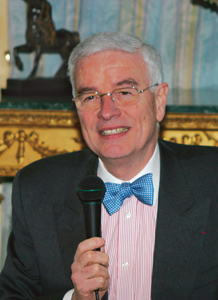 Romania is about to make itself known
to more than 50 nations in an international
summit where it has a chance to
communicate its recent progress and
set up international links – and its representatives
do not even have to move
anywhere.
Romania is about to make itself known
to more than 50 nations in an international
summit where it has a chance to
communicate its recent progress and
set up international links – and its representatives
do not even have to move
anywhere.
Bucharest will host the Summit of the
Organisation Internationale de la Francophonie
(OIF) this September, with
events starting this month.
Proposed at this summit will also be
the setting up of a Francophone University,
specialised in social and humanistic
sciences, in Bucharest.
Politically, this could help other
countries begin to realise that this new
Romanian Government is serious about
taking an active role in international development
and conflict resolution.
“Hosting the summit offers Romania
a very good opportunity to show its
stronger involvement in international issues,”
says Herve Bolot, Ambassador of
France to Romania.
Economically, it will help showcase
Romania’s industrial and commercial
development over the last 16 years.
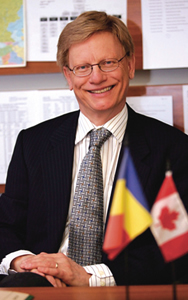 “It is a great shop window for the
host country,” adds Jean Therriault,
counsellor at the Canadian Embassy in
Bucharest. “I am sure Romanians will
realise the chance they have to host an
event of this scale just before the integration
in the European Union. The timing
couldn’t be better.”
“It is a great shop window for the
host country,” adds Jean Therriault,
counsellor at the Canadian Embassy in
Bucharest. “I am sure Romanians will
realise the chance they have to host an
event of this scale just before the integration
in the European Union. The timing
couldn’t be better.”
Common tongue
One of the few global languages of
business, culture and education, French
has lost out in the last 30 years to English.
In Romania, it has also conceded
some ground to German, which is growing
in popularity.
“There is a trend in considering Francophony
is on the defensive,” says Cristian
Preda, state secretary for Francophony
and representative of the President of
Romania for Francophony. “It is commonplace
to hear that ‘Francophony is
not doing too well’, just as we hear that ‘politicians are corrupt’. The landscape
is much more diverse than this.”
Preda argues that this generalised
perception is not empirically true. The
country has 15,000 French teachers.
There are thousands of parents who
choose a multilingual education for
their children. Also, the trend in local
job recruitment is to pick candidates
who speak not one, but two foreign languages.
“[In Romania] there are many good
English speakers who are also good
French speakers,” says Preda. However
there are many multinational companies
with French origins which use English
as the lingua franca of business.
FLEXIBLE FRIEND
|
||
Language gifts are inherent to Romania
which has a culture of multi-linguism.
Romanians had a diverse education in
the 19th century, where its elite travelled
extensively to France, Belgium, Germany
and Italy. Preda says there are many
writings of foreign travellers who, passing
through the Romanian provinces,
noticed this people’s capacity to speak
several languages.
“We have never been monomaniacs
and we should capitalise upon this,”
adds Preda.
Such flexibility has allowed Romanians
abroad to adapt to difficult working
conditions in the EU, in a legal or illegal
context. This adaptability also benefits
their home country.
“Foreign investors who come to Romania
like the way in which business is
done and not only because labour force
costs are small,” says Preda, “as they are
not that small anymore, but because they
can find the education and expertise they
need, allowing them to do business here
just like in any other European country.”
After 14 months in this country, Bruno
Vinette, general manager of Sofitel Romania,
believes that Romanians do not pay so much attention to the language
they are using for business.
“They are flexible and a business meeting
can be done in French or English and
eventually in Romanian language when
foreigners are able to speak it,” he adds. “It happened to me many times that I
started the business discussion in English
and we ended it in French.”
Vinette says he feels no language barriers
in Romania, as he did in Russia,
where his previous posting was.
“It seems to be very easy to communicate
with local people as long as we
make an effort to understand a little bit
of the Romanian language,” he adds.
In Sofitel, part of French group Accor,
Vinette maintains a Gallic touch. His
staff greets guests in the reception and
restaurant in French, although they adapt
to other languages when necessary.
“Without being chauvinistic, I do believe
that with ‘Bonjour’ we are giving
a better welcome to our client than a ‘Good morning’,” says Vinette.
STUDY LINKS
The first Francophone University in
Europe, outside of the nations who have
French as an official language, could
be founded in Romania. This will specialise
in social and humanistic sciences
and will be part of Romania’s proposals
at the International Summit this September. The university aims to have a
headquarters with full and part-time
professors.
A graduate school for individuals
studying doctorates and undergoing research,
this is aimed at consolidating
the study of French in Romania, says
Preda.
It will also be an open university, with
courses online. Financing will come
from the OIF, Francophone member
countries and Romania.
Currently there is a Francophone University
in Alexandria, Egypt, Senghor
University, which specialises in economic
studies and management.
AFRICAN DAWN
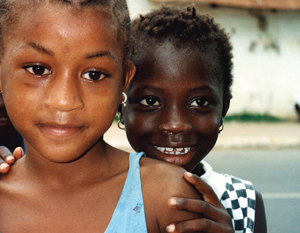 Politically, this will be a great opportunity
for Romania.
Politically, this will be a great opportunity
for Romania.
“The country’s role as an important
player on the political scene will be
increased,” says Eric Thibeault, OIF
programs coordinator for central and
eastern Europe. “Let’s not forget the
strategic partnerships that Romania
could win from the summit.”
One benefit will be the renewal of relations
with former French colonies and
the African states.
“In Africa, Romania has an excellent
image,” adds Preda. “Romania has an
advantage in this continent that it hasn’t
used for many years now.”
In the 1970 and 1980s many Romanian
doctors, engineers and teachers worked
in development support programmes in
north and sub-Saharan Africa. At the
same time, many Africans studied in
Romania.
“During the fall of the Communist
regime, the ties with Africa were cut,”
Preda says. “Africa disappeared out of
Romanians minds when Communism
itself disappeared.”
This relationship should be rebuilt.
“Why shouldn’t Romania use the advantage
of having been there, of having
left behind a very good image and why
shouldn’t we build strong economic ties?
A strategy of return to Africa would
be welcomed by the African continent.”
This is backed up by the embassies
in Bucharest.
“Congo and Romania have to
take advantages
of OIF’s programs
in terms
of economic cooperation,”
says
George Ambara,
charge d'affairs
for the Republic
of Congo
to Bucharest. “Both countries
may establish
a partnership
between chambers
of commerce and industries,
with the aim of stimulating the contacts
between economic players and
favouring commercial trades.”
Romania’s often shaky experience
in its quest for democracy could be
useful for African countries now
looking for political stability.
But this is not a matter of teaching,
says Preda: “Democracy is not something
which can be taught, it is a political
and social experience which is always
built through a country’s own resources,
with no teachers and pupils.”
DIVERSE OPINION
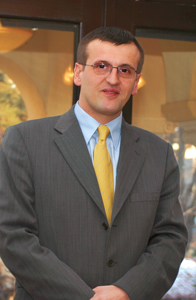 “Diversity must be cultivated,” Preda
believes. “Francophony is not a weapon
against any other language which is
not French, nor is it a club of quarrelsome
linguistic obsessions.” This means
adapting the Francophone message to the
specific characteristics of the area. Preda
says that Francophony supports the development
in Africa of local languages
whereas, in Romania,
Francophony
may mean supporting
French education.
“Diversity must be cultivated,” Preda
believes. “Francophony is not a weapon
against any other language which is
not French, nor is it a club of quarrelsome
linguistic obsessions.” This means
adapting the Francophone message to the
specific characteristics of the area. Preda
says that Francophony supports the development
in Africa of local languages
whereas, in Romania,
Francophony
may mean supporting
French education.
Some statistics
have placed French
as the third most popular
language that
children in Romania
want to learn, after
English and German.
With France
arguably losing its
dominance in the EU
to Germany and, to a certain extent, the
UK, will this also have an effect on the
strength of language learning?
Preda says that thinking whether to
put money on either France or Germany
is reducing the EU politics a matter of
betting on the winning jockey at a horse
race.
“Europe,” he says, “is not a sports stadium.”
Report by Ana-Maria Smadeanu,
Anca Pol and Michael Bird
LUXEMBOURG
INCREASING FINANCIAL
POSSIBILITIES
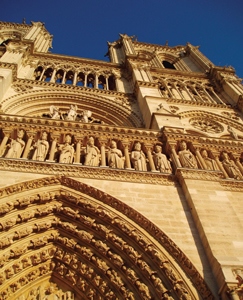 “Luxembourg, as a financial
centre of great importance on the
world scene, is interested, through
its 202 banks and 100 investment
funds, in establishing good economic
relations with any country
and especially with Romania,”
says Mihai Ferariu, general consul
of Luxembourg to Romania. “This
is proved by the presence of very
important investments.”
“Luxembourg, as a financial
centre of great importance on the
world scene, is interested, through
its 202 banks and 100 investment
funds, in establishing good economic
relations with any country
and especially with Romania,”
says Mihai Ferariu, general consul
of Luxembourg to Romania. “This
is proved by the presence of very
important investments.”
FRANCE
PROMOTING
CULTURAL EXCHANGE
“The Summit will allow Romania
to promote itself and its values
and in the meantime its advantages,
which may help the country create
new relations in the economic
field,” says Herve Bolot, Ambassador
of France to Romania.
The year of Francophony gives
France a chance to reinforce its
cultural and economical relations
with Romania. Upcoming events
include a ‘Coup de theatre’ with
more than 50 plays in French and
Romanian. May will see a weekend
dedicated to a mixture of French-
Romanian theatre, dance, classical
music and contemporary art. In
June the Francophone cinema and
music festival will take place in
12 Romanian cities. In September
the National Museum of Art will
host an exhibition by expressionist
painter Emile Antoine Bourdelle.
EGYPT
DEMONSTRATING A GREAT
INVESTMENT CLIMATE
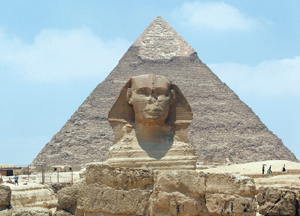 “Undoubtedly, the Francophony, as
a multi-national forum for debates and
discussions, will help increase the cultural
and economic ties between Egypt
and Romania,” says Fawzi Gohar, Ambassador
of Egypt. “The various fora
and sub-committees within the organisation
can be a catalyst to start projects
of utmost importance, economy-wise,
to both countries. As French-language
speaking countries, both share the same
values of culture which can bind them
together to preserve their rich heritage
of archaeology and art. Diplomatically, the Francophony Summit will be one
of the major international events that
Romania hosts in its modern history, a
factor which will be a plus in the efforts
exerted by the Romanian side to join the
EU in January 2007, and give a good
image of Romania, regionally and internationally.”
“Undoubtedly, the Francophony, as
a multi-national forum for debates and
discussions, will help increase the cultural
and economic ties between Egypt
and Romania,” says Fawzi Gohar, Ambassador
of Egypt. “The various fora
and sub-committees within the organisation
can be a catalyst to start projects
of utmost importance, economy-wise,
to both countries. As French-language
speaking countries, both share the same
values of culture which can bind them
together to preserve their rich heritage
of archaeology and art. Diplomatically, the Francophony Summit will be one
of the major international events that
Romania hosts in its modern history, a
factor which will be a plus in the efforts
exerted by the Romanian side to join the
EU in January 2007, and give a good
image of Romania, regionally and internationally.”
LEBANON
A SHOWCASE FOR DIVERSITY
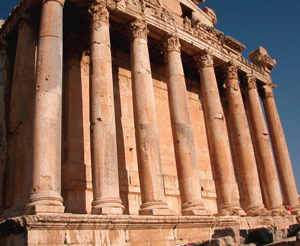 In 2002 Lebanon hosted the ninth
Summit of the Francophony, which
helped promote the country to the rest of
the world. “Lebanon seized the occasion
of promoting its multicultural identity,”
says Mohammed El-Dib, Ambassador of
Lebanon to Romania. The summit was
preceded by a series of cultural events,
meant to raise the awareness of the Lebanese
public in regard to the values of the
Francophony, while making it discover
the diversity the phrase implies. According
to him, the Summit also dynamised
the economic exchanges in the frame of
Francophony. Lebanon itself is already a
strong economic partner of Romania.
In 2002 Lebanon hosted the ninth
Summit of the Francophony, which
helped promote the country to the rest of
the world. “Lebanon seized the occasion
of promoting its multicultural identity,”
says Mohammed El-Dib, Ambassador of
Lebanon to Romania. The summit was
preceded by a series of cultural events,
meant to raise the awareness of the Lebanese
public in regard to the values of the
Francophony, while making it discover
the diversity the phrase implies. According
to him, the Summit also dynamised
the economic exchanges in the frame of
Francophony. Lebanon itself is already a
strong economic partner of Romania.
“The role of the host country in the
creation of the final declaration of the
Summit is undeniable,” he says. “It allows
the country to put the accent on its
political priorities and to insist on the
objectives it proposes for the Organisation it is part of to adopt.”
Also the organisation of such a highscale
summit brings economic and
tourist benefits. “A pleasant stay of more
than 2,600 top guests requires the mobilisation
of all the talents [of the host
country], especially in the fields of
tourism, hotels and gastronomy,” says
El-Dib. Lebanon has been the guest of
honour at the Francophone Film Festival
in Bucharest last February and the
Embassy will organise a Lebanese Film
Festival in May.
DEMOCRATIC REPUBLIC OF CONGO
EXHIBITING SAVOIR-FAIRE
“Francophony will allow the Democratic Republic of Congo to reveal its new country image and present concrete opportunities to Romania in terms of investment in culture and technology, but also in the economic and industrial fields,” says Kumbu-ki-Phoba, charge d’affaires. Mining potentials exist and in terms of raw materials the Democratic Republic of Congo sees “a lot of potential which hasn’t yet been explored and definitively suits Romania” such as in petroleum, cobalt, diamond, uranium, marble and zinc. “Francophony offers a proper frame for a multinational dialogue, exchanges and discussions between the political, economic and cultural players of both Romania and Congo with the aim of accomplishing many projects with mutual interest for both countries.”
CANADA
LOOKING BEYOND EUROPE
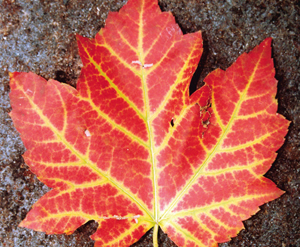 “I think this Summit of the
Francophony will bring about a great
discovery for the Romanians. They
often have the idea that the Francophony
means France, but it is much more
than that. Also, Francophony is not just European,” says Jean Therriault,
counsellor with the Canadian Embassy
in Bucharest.
“I think this Summit of the
Francophony will bring about a great
discovery for the Romanians. They
often have the idea that the Francophony
means France, but it is much more
than that. Also, Francophony is not just European,” says Jean Therriault,
counsellor with the Canadian Embassy
in Bucharest.
Just under one third of Canada’s 32
million citizens speak French as their
first language and Canada offers Romania
financial aid of almost 1.5 million
Euro for the organisation of the Summit. Canada’s contribution includes helping
build the temporary Village of the
Francophony in Parcul Izvor, opposite
Palatul Parlamentului, due to be opened
in parallel with the Summit in September. “The Village is a special place in the
capital,” says Therriault. “Everybody
who wants to know what Francophony
is can get together and participate at the
international Francophone life. All the
Francophone countries participating in
the Summit will have stands there and
will organise various cultural activities.”
REPUBLIC OF CONGO
REGAINING RELATIONS
Romania and the Republic of Congo
have had dynamic economic and cultural
cooperation until the end of 1980s.
Once the regimes changed, the cooperation
collapsed. “The Bucharest summit
is a unique occasion to make the relations
between Congo and Romania more
dynamic,” says Georges Ambara, charge
d’affaires for the Republic of Congo to Bucharest. “Since 1985 there hasn’t
been any meeting at high level between
the two countries and the presence in
Bucharest of a Congolese Government
delegation at the summit is an opportunity
for bilateral relations.”
Francophony can act as a framework
for renewing relations. This includes
partnerships between universities, radio
stations and television and literature
group trades to bring a better understanding
of countries’ culture, economy
and people, especially in promoting the
translation of Congolese and Romanian
writers into each others’ languages.
SWITZERLAND
SEEING THE BEST OF ROMANIA
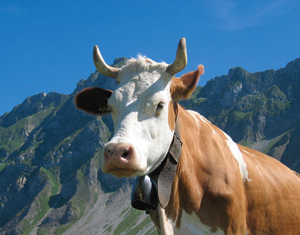 “Francophony is one of the strongest
affinities between Switzerland
and Romania and represents a strong
tie between the two countries,” says
Dominique Petter, charge d’affaires at
the Embassy of Switzerland. “French is
very important in Romania, as a Latin
country, while in Switzerland it is the
mother tongue of around 30 per cent of
the population.”
“Francophony is one of the strongest
affinities between Switzerland
and Romania and represents a strong
tie between the two countries,” says
Dominique Petter, charge d’affaires at
the Embassy of Switzerland. “French is
very important in Romania, as a Latin
country, while in Switzerland it is the
mother tongue of around 30 per cent of
the population.”
She adds that common links in the
languages help both communication
and kinship. “For example, if a Frenchspeaking
tourist comes for the first time
to Romania, he has the joy of noticing
that he can already understand certain
words and expressions.” Petter believes
it is important that many journalists will accompany the national delegations to
the summit. “They will broadcast to the
entire world images and reports from
Bucharest,” she says. “So I hope their
reports will go behind the conference
halls, so that their readers and viewers
from abroad can find out about the diversity
and beauty of this country and
its capital. I wish they will grow curious
and pay a visit to Romania.”
WALLONIE
BRUXELLES
A MAGNIFICENT
RESPONSIBILITY
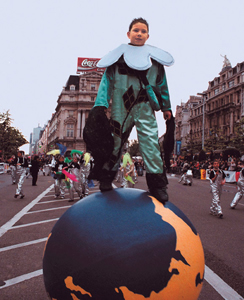 “The presence of a Wallonie-
Bruxelles Delegation in Bucharest
proves the importance that the
Belgium regions of Franchophone
communities show to Romania,”
Franck Pezza, counsellor at the
delegation of Wallonie-Bruxelles,
which supports and establishes
educational and professional exchanges
between Romania and
Belgium, with a focus on culture
and multi-linguism. “The year of
Francophony in Romania will be
an occasion of reinforcing more
human, cultural and economical
relations and other links between
Belgian French-speaking and Romanians,
to the benefit of all.”
“The presence of a Wallonie-
Bruxelles Delegation in Bucharest
proves the importance that the
Belgium regions of Franchophone
communities show to Romania,”
Franck Pezza, counsellor at the
delegation of Wallonie-Bruxelles,
which supports and establishes
educational and professional exchanges
between Romania and
Belgium, with a focus on culture
and multi-linguism. “The year of
Francophony in Romania will be
an occasion of reinforcing more
human, cultural and economical
relations and other links between
Belgian French-speaking and Romanians,
to the benefit of all.”
Pezza adds: “This is a magnificent
responsibility for a well chosen
country to assume its role on an
international plain, and this with
some months before being fully a
member of the European Union.
This Summit is a historic chance
for Romania to show its know-how,
to stand up for itself, to give a positive
and welcoming image and to
win over the Francophone political
and economical representatives.”
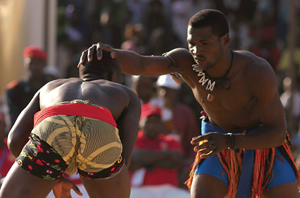 |
| Annual Francophony highlights |
MARCH 20th: The International Day of
Francophony 20 to 28th: The General Meeting
of Francophony (Etats Generaux de
la Francophonie). Six fora will be
organised in Bucharest, Iasi, Cluj-Napoca 21 to 22nd: Bucharest: ‘Goods and Cultural services’ (Biens et Services Culturels) forum 21 to 23rd: Bucharest: ‘Massmedia and information’ (Presse et Information) forum 22 to 23rd: Timisoara: ‘New Technologies of Francophony’ forum (Nouvelles Technologies de la Francophonie ) 23 to 25th: Cluj-Napoca: ‘New Solidarity
and Francophony’ (Nouvelles 25 to 26th: Bucharest: ‘Innovate in French: discovering itineraries’ forum (Innover en français: itinéraires de découverte) 27 to 28th: Iasi: ‘Universities and
Francophony’ forum (Universités et 29th: Closing date of the General Meeting. Concert by Dee Dee Bridgewater at Teatrul National APRIL 3 to 12th: Francophone theatre festival ‘Coup de theatre’. Opening with 17 to 23rd: Francophone Invention
and Innovation Exhibition at Cercul JUNE 1 to 15th: two weeks of Francophone movies, between 15 and 19 June in Bucharest debates on ‘The women inside the Francophone space’ There will also be a play festival for children at Teatrul Tandarica and a music festival ‘Fete de la musique’ from 21 to 25th in 12 cities 25th June to 2nd July: Sinaia will hold the 20th Worldwide Congress of International Council of Francophone Studies JULY 1 to 31st: ‘La Passerelle Brancusi’, sculpture workshop at Hobita (Gorj county), the birthplace of Brancusi AUGUST Buildings in Bucharest built by French architects will be illuminated. In Constanta there will be an ethnic jazz festival organised by the Ministry of Culture SEPTEMBER Bourdelle Exhibition and ‘Mot a
main’ exhibition, showing images
and writings on Belgian art, National
Art Museum Bucharest |
BUSINESS GAINS
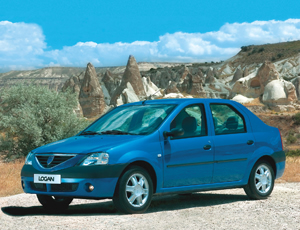 “Francophony, the French
language and France are traditionally
associated with
culture, tradition and history
and not so much with
the economy, which I think
is a big mistake,” says Patrick
Gelin, chairman and CEO
of BRD - Groupe Societe
Generale.
“Francophony, the French
language and France are traditionally
associated with
culture, tradition and history
and not so much with
the economy, which I think
is a big mistake,” says Patrick
Gelin, chairman and CEO
of BRD - Groupe Societe
Generale.
“This summit will be an
opportunity for all French
companies to state that France
is a big investor in Romania,
the second largest, and to
show that French companies
are covering all the main
sectors in the country. A situation
that will continue.”
In the 1990s Renault resumed
its relationship with
Dacia and has since manufactured
a cost-effective family
car in the Logan, which is
now being exported to western
and eastern Europe.
“The Dacia Logan is a vector
of Francophony,” says
Gelin. “Its commercial and
industrial success has had
a big impact on the restructuring
of the economy of
Romania.”
The Renault-Dacia factory
in Pitesti is now seen as
a blueprint for how successful
manufacture can have a
knock-on effect in attracting
other industries and jobs to a
Romanian region threatened
by industrial decline.
“In the last two to three
years this has had a big impact
on the trade balance of
Romania,” Gelin adds. “This
is a perfect illustration and
image of the success of the
Francophony.”
One characteristic of French investment in this
country, according to Gelin,
is that they make long-term
investments and do not come
to earn a lot of money in two
or three years’ time and then
leave.
“All French companies are
here to be part of the development
of Romania,” he adds.
From the diplomatic side,
Francois Oliver, executive
director of Carrefour Romania,
says this summit will be
a great opportunity for building
up trade and investment.
“Important players on the
diplomatic world will come
to Romania, some of them
will be in this country
for the first time.
It will be an excellent
opportunity
for Romania to win
awareness at a worldwide
level,” he says. “All these important
people will go back to
their countries with
a new vision of Romania
and with new
perspectives on investments.
It is a welcome possibility of
communication.”
With French investment in
Romania at 3.3 billion Euro
and trade up 8.5 per cent in
2005 on the previous year to
3.8 billion Euro, Ambassador
of France, Herve Bolot, says: “With the perspective of joining
the European Union and
the process of improving the
business environment, the
Romanian market should
continue to offer important
economic perspectives for French investors.” Business
leaders also see the possibility
of opening a French Business
School in Romania. One already
exists in Sofia.
